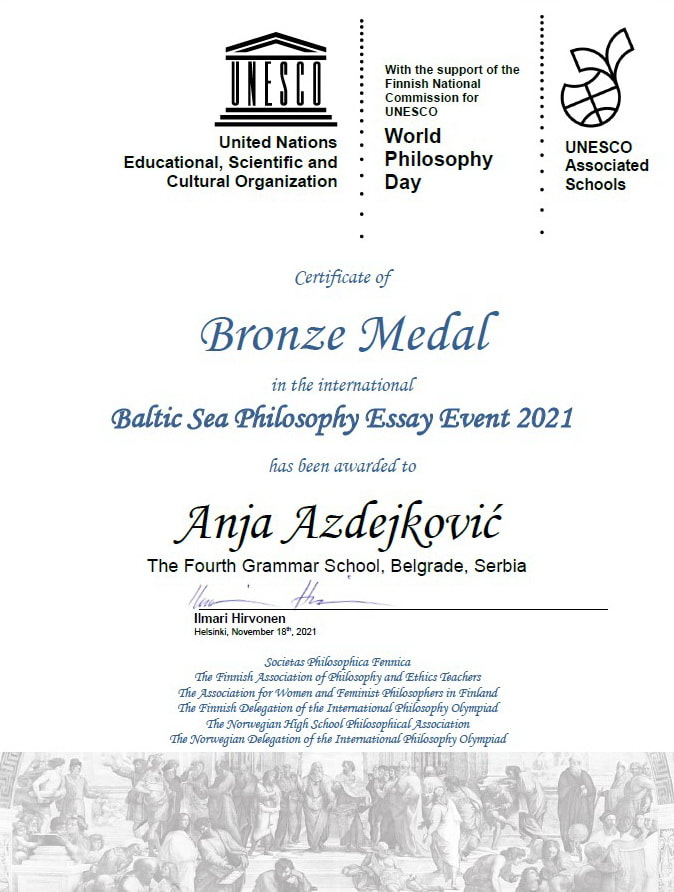|
Поводом Светског дана филозофије, Финско удружење наставника филозофије и етике (Finnish Association of Philosophy and Ethics Teachers - FETO), Филозофско друштво Финске (Philosophical Society of Finland - SFY),) и Удружење жена и феминистичких филозофа у Финској (Association for Women and Feminist Philosophers in Finland - NFY)) уз помоћ Норвешког философског удружења средњих школа, организује међународни догађај - Писање филозофског есеја, за ученике виших разреда средњих школа. Тако је и наша ученица, Ања Aздејковић, уз успешно менторство своје наставнице филозофије, Јелене Остојић, добила прилику да се представи као млади филозоф на овом међународном конкурсу, на који су своје радове послали ученици из десет земаља. Међу 262 рада, колико их је било у конкуренцији, Ањин есеј освојио је бронзану медаљу! Мало је рећи да смо поносни. ANJA AZDEJKOVIĆ, THE FOURTH GRAMMAR SCHOOL, BELGRADE, SERBIA
“In argument about moral problems, relativism is the first refuge of the scoundrel.” Roger Scruton: Modern Philosophy, London: Sinclair-Stevenson (1994), p.32. In pursuit of the preservation of truths and rules tangible to it, mankind has historically relied upon dogmatic religions and righteous values to build its civilizations. Those exact truths built one upon another interchangeably, for thousands of years, creating what we knew as objective morality. It is of concern for those like Sir Roger Scruton, who wish to conserve what’s left of traditional, purposeful morale, that our modern civilization seems to be heading into the deep hole of cowardly relativism. Opposing a scoundrel, a one with a disintegrating sense of objectivity and purpose, with the repercussions of objective morality, will inevitably cause him to seek safety. Even if that safety is found in the destruction of principles of our society. As we move further away from objectivity and undertake the ideas of a post-modernistic nihilistic world, we make of ourselves those who are either comfortably and blissfully good, thus static, or those who hide their monstrousness behind the idea of relativism. When Sir Scruton compares relativism to a refuge, it insinuates that a man who behaves badly is afraid of how morality would cause him to face his flaws, and punish him. Relativism could thus be seen as a form of escapism from our own insufficiency. In such a sense, if we recognize that morality causes those who don’t match it to suffer, we see that it’s not really the morality that the scoundrel fears, but what it would inflict on him. Considering the scoundrel as someone who only obeys the ideas of uncertainty and relativism, his stands would likely transfer to how profoundly he would look onto his own suffering. In the words of Friedrich Nietzsche, “The meaninglessness of suffering, not suffering itself, was the curse that lay over mankind so far.”, we might find where that fear comes from. A dishonest man repudiates suffering by merging good and bad into one because he is inept from seeing the fundamentality of deed. In trying to remove the idea of objective morality, we also remove the idea of punishment and sorrow, thus getting rid of any chance to make meaning of our malicious dishonest deeds. Whilst diminishing the ideas of right and wrong, we rob ourselves of redemption, we rob ourselves of growth. A scoundrel might thus call upon the insignificance of our existence in the grandiosity of the universe, upon how anything good or bad we do will remain as such not causing any change. Any act of a man, would then just as the action of an ant, be seen as almost non-existing compared to this cold spinning rock that carries us in what seems to be infinite boundless space. But such states of mind come to be almost malignant when we aspire to find why morality was something that came to existence in the first place. It is not to be seen as a conscious act that one feels the inner serenity when doing good and a sense of emptiness when doing bad. Our intuitive and unconscious need for rightness will bring up the sentiment which tells us the only way to escape objective morality is by being untruthful to ourselves. In a world filled with chaos that seems to harmonize itself with rules and principles which were obvious to us since ancient times, the undoing of them would be seen as a way one man could act from fear, from dishonesty and from hedonistic urges. The scoundrel who wants to subject the nature of morality to relativity and subjectivity is the one who seeks detachment from our true selves and our purpose. Thus giving existence a manmade feel, putting himself as the ultimate creator and letting the ego overtake.
0 Comments
Your comment will be posted after it is approved.
Leave a Reply. |
АуториУченици Четврте гимназије у Београду Архива
August 2023
Категорије
All
|



 RSS Feed
RSS Feed
